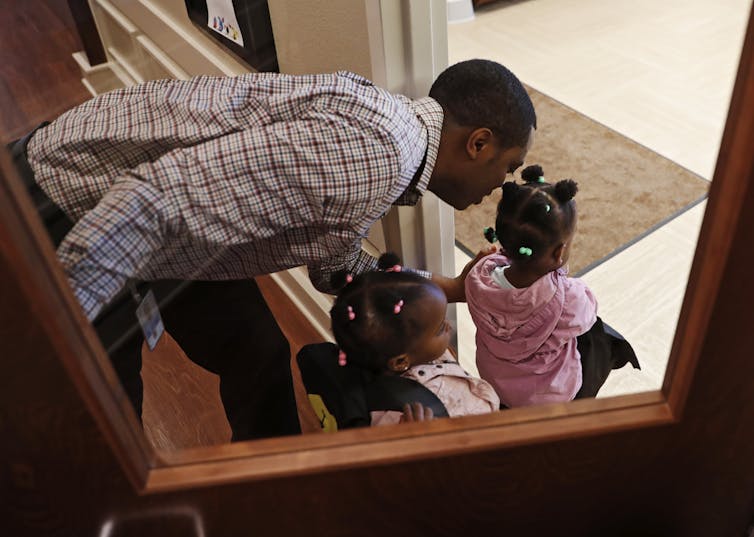
Jessica Troilo, West Virginia University
By the time Father’s Day takes place, the school year is usually over.
In many ways, that’s an apt metaphor for how divorced fathers – or fathers who don’t live with their children – get treated by their children’s schools. That is, they’re often simply not seen as part of what takes place at school. These fathers are often viewed as irresponsible and uninvolved.
I learned this by talking to 20 fathers as part of my research. I found that divorced fathers, especially those who don’t share a residence with their children over 50% of the time, can find it challenging to remain involved in their children’s academic development. Several fathers told me about how often teachers and administrators at their children’s schools fail to recognize them.
“My son’s school never calls me,” one father told me in a statement that could be emblematic of the plight of noncustodial fathers.
Messages home
Many schools simply assume mothers are the primary parent to contact regarding schooling. Consequently, I found schools tend not to send information to both parental households or inform nonresidential fathers about how their children are doing in school.
Divorced dads also told me that they often found out about school events at the last minute – if at all.
When schools treat fathers like they don’t exist, it’s not serving students well.
Academic and social benefits
When fathers who don’t live with their children are involved with their kids’ school, the kids are less likely to repeat a grade or be suspended. They are also more likely to have higher grades.
Children who have more involved fathers also tend to be psychologically, cognitively and physically healthier. When fathers take active roles in reading with and to their children, support their academic outcomes and are involved with their schools, children tend to graduate high school and have financial stability as adults.
The difference that involved fathers make begins early. For instance, children with fathers who spoke more words while reading to them as children grew up to have stronger vocabulary and math skills compared to peers whose fathers spoke less.
Fathers can also disrupt some of the negative influences in the community – such as crime, dropping out of school and earning less money – when they are more involved in their children’s education.
Being involved in children’s education is even more critical for children of color as compared to white children because of systematic racism some parents of color experience.
Father involvement may be especially important for Latino boys’ academic motivation. Similarly, children of African American fathers who have high academic expectations are often more academically successful as a result.
This benefit can exist whether they share the same residences with their children or not.
Divorced mothers face challenges, too. When couples divorce, mothers become less involved in their children’s schooling, usually because of having to work longer hours outside the home.
Using tech to bypass drama
Of course, when divorced dads have conflicts with their children’s mothers, it can make it more challenging to stay involved in their children’s education. The fathers I spoke with said conflicts with their former spouses often led them to find out about parent-teacher meetings, school activities or extracurricular performances after the fact.
Some fathers sought to work around the conflict by using email or text messages. One father texted his daughter every day because “it’s just like you’re there.” This way, he said, he learned the dates of important tests and how she did on them. He also learned about her swim meets. Another father with younger children said his former spouse let him know about a play his son was in “only 30 minutes before it started.”
“Thankfully I have a flexible job and could make it,” the father said.
Research shows the benefits of father involvement transcend academics.
Some research suggests that these benefits extend to other areas of their children’s lives because kids feel good when dads are invested.
Persistence and consistence can be a challenge. One study found that two or three years after a divorce, 22% of fathers no longer had contact with their children and only 31% saw their children each week.
For all these reasons, I see an urgent need for schools to make sure that fathers are given an opportunity to play a meaningful part of their children’s education. Father’s Day may come at the end of the school year or when school is out. But that doesn’t mean they should be ignored throughout the rest of the school year.
Jessica Troilo, Associate Professor of Child Development and Family Studies, West Virginia University
This article is republished from The Conversation under a Creative Commons license. Read the original article.












